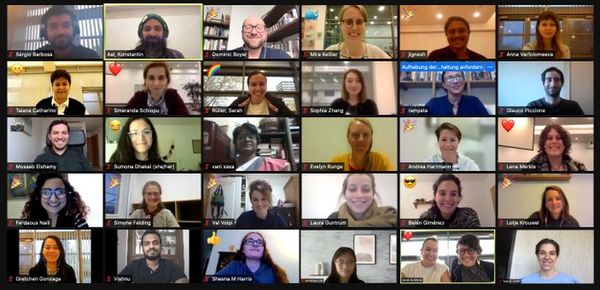- You are here:
- Startseite
- Doctoral Researchers
- Funding for Internationalization
- Project International Event
- Funded International Events
- Disrupted Ethnography
How to move beyond established practices
Impressions from the Autumn School “Disrupted Ethnography”
Due to the ongoing pandemic, ethnographic researchers are facing a special challenge: closed borders and travel bans are disruptions we have to deal with. But there are also other disruptions which we have always been confronted with. According to the motto “thinking out of the box”, we started a dialogue between academics and practitioners, like journalists and activists, who have comparable ways and challenges of working in a field. The guiding questions were: What can we learn from each other? What new approaches can junior researchers develop that cannot be found in methodological manuals?

"Disrupted Ethnography" had thus already been a question in organizing the autumn school, namely how we could overcome the hurdle of travel restrictions and country borders (be it because of Covid or lack of funding). The excitement of organizing a hybrid event paid off. We were able to exchange ideas on our laptops with colleagues from all corners of the world - such as Turkey, India, Palestine, Morocco and the USA. In exchanges with Jignesh Patel (India), Ramyata Limbu (Nepal), Mariam Barghouti (Palestine) and Mosa'ab Elshamy (Morocco), we young scholars were able to look beyond our academic book covers.
Our experts
Jignesh Patel, a fact-checker and media & information literacy trainer from India, exchanged with the Phd students and postdocs how they can remotely access the field and build trust with distant sources. This is challenging when they must contact researched persons, potential research assistants or gatekeepers via text message, video chat or telephone.
Ramyata Limbu from Nepal, Head of Operations of Panos South Asia (PSA), Director of the Kathmandu International Mountain Film Festival (kimff) and a journalist, exchanged views with the participants on different "perceptions of the world". Especially for countries and people from the so-called "global south" the outside view and attribution in films but also in research are difficult. As a media development worker Ramyata provided insights into the difficulties foreign (aid) workers have had in gaining access to Nepali communities due to a lack of knowledge of local values, traditions, and rules of conduct.
Mariam Barghouti, a Palestinian writer and researcher based in Ramallah, addressed ethical and normative issues of fieldwork and reporting in her workshop "Reporting from within - challenging objectivity under oppression". Especially in the research of vulnerable groups and in their possibly necessary protection, the own role conception can shift from "objective" reporting to an activist or mobilizing one.
Mosa´ab Elshamy, a staff photographer for the Associated Press based in Morocco, aimed with his workshop at covering the practice of photojournalism and the challenges it faces today. The question of the representation of the "researched", whether through images or language, also plays a role in ethnographic work.
Dominic Boyer, Professor in anthropology at Rice University in den USA, united two roles in himself, as he is also a writer, filmmaker and podcaster. He spoke in his keynote about his understanding and experiences with ethnography in disrupted times. In particular, he focused attention on the possibilities of intellectual and artistic collaboration between ethnographers and their partners in fieldwork and on the importance of diversifying ethnographic engagements across different media as a way of communicating anthropological insights within an extremely diverse and fast-paced mediascape.
This conference was oranized by Mira Keßler. If you have any questions about the conference, she will be happy to hear from you via e-mail.
- Research related competencies: Workshops & Events
- Career Preparation: Workshops & Events
- Research Management Skills: Workshops & Events
- Full list of workshops & events
- Funding for Internationalization
- Advising & Ombudsperson
- Doctoral Database
- Welcome Hour
- Newsletter
More information about the conference
If you want to learn more about the conference, please visit the homepage of the event.


